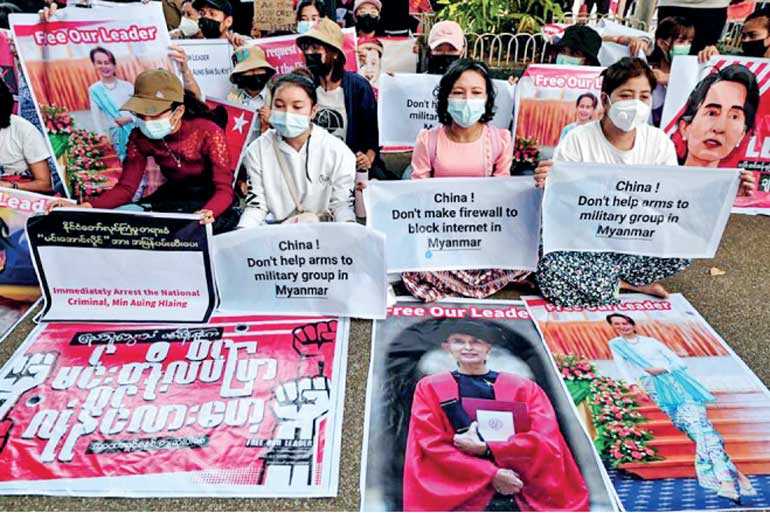Monday Feb 23, 2026
Monday Feb 23, 2026
Saturday, 13 February 2021 00:00 - - {{hitsCtrl.values.hits}}

Reuters: Supporters of ousted Myanmar leader Aung San Suu Kyi clashed with police on Friday as hundreds of thousands joined nationwide pro-democracy demonstrations in defiance of the junta’s call to halt mass gatherings.
Mostly peaceful protests erupted around the Southeast Asian country in the biggest mass demonstrations so far against last week’s military coup, a day after Washington slapped sanctions on the generals who led the takeover.
Three people were injured when police fired rubber bullets to break up a crowd of tens of thousands of protesters in the southeastern town of Mawlamyine, a Red Cross official told Reuters.
Footage broadcast by Radio Free Asia showed police charging at protesters, grabbing one of them and smashing him in the head. Stones are then thrown at police before the shots are fired.
“Three got shot – one woman in the womb, one man on his cheek and one man on his arm,” said Red Cross official Kyaw Myint, who witnessed the clash.
“The crowd is still growing,” he added.
In the biggest city Yangon, hundreds of doctors in white duty coats and scrubs marched past the golden Shwedagon pagoda, the country’s holiest Buddhist site, while in another part of town, football fans wearing team kits marched with humorous placards denouncing the military.
Other demonstrations took place in the capital Naypyitaw, the coastal town of Dawei, and in Myitkyina, the capital of northern Kachin state, where young men played rap music and staged a dance-off.
Social media giant Facebook said it would cut the visibility of content run by Myanmar’s military, saying they had “continued to spread misinformation” after seizing power in the Feb. 1 coup.
As Washington announced sanctions, European Union lawmakers on Thursday called for action from their countries and Britain said it was considering measures to punish the coup leaders.
Supporters of Suu Kyi’s National League for Democracy (NLD) welcomed the US sanctions but said tougher action was needed to force the military to release Suu Kyi from house arrest and recognise the NLD’s landslide victory in November elections.
“We are hoping for more actions than this as we are suffering every day and night of the military coup here in Myanmar,” Suu Kyi supporter Moe Thal, 29, told Reuters.
The coup has prompted the biggest demonstrations since a 2007 ‘Saffron Revolution’ that ultimately became a step towards now halted democratic change.
Friday’s protests marked the seventh consecutive day of protests, including one on Thursday outside the Chinese embassy where NLD supporters accused Beijing of backing the junta despite Chinese denials.
Security forces carried out another series of arrests overnight Thursday.
The junta remitted the sentences of more than 23,000 prisoners on Friday, saying the move was consistent with “establishing a new democratic state with peace, development and discipline” and would “please the public”.
Among the prisoners released was ethnic leader Aye Maung from the western state of Rakhine.
The military seized power on Feb. 1 after what it said was widespread fraud in the election in November, although the electoral commission has said the vote was free and fair.
Nobel Peace laureate Suu Kyi, 75, came to power following a historic election victory in 2015. She now faces charges of illegally importing six walkie-talkie radios and has not been seen in public since the coup.
The US sanctions target 10 current and former military officials, including coup leader General Min Aung Hlaing. It also blacklisted three gem and jade companies it said were owned or controlled by the military.
Min Aung Hlaing and other top generals are already under US sanctions over abuses against Rohingya Muslims and other minorities, and some analysts question whether the latest penalties will have much effect.
Derek Mitchell, former US ambassador to Myanmar and president of the Washington-based National Democratic Institute, said US sanctions alone would have little impact without “tough messages” from US partners such as Japan, Singapore and India.
“Min Aung Hlaing had already been sanctioned, so ... I don’t think he is concerned about the United States right now,” he said.
The UN Human Rights Council is due to discuss Myanmar at a special session on Friday.